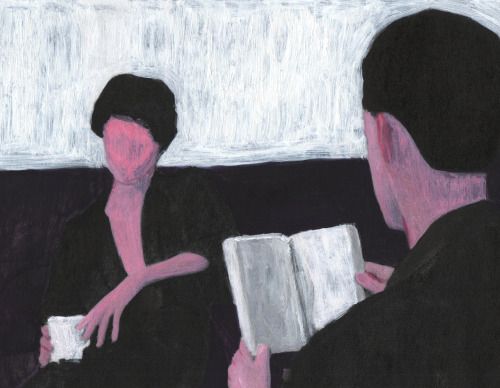
Neptune: The Unobtainable Lover
 When Neptune makes its way into the realm of love — especially through aspects to Venus, the 5th and 7th house, or even Mars — we find ourselves beguiled by the idea of others. We fall for the silhouette painted in moonlight and longing. It’s romance at its most cinematic — and its most tragic. Often Neptunian types are drawn to those deemed “off-limits” — the married, the unavailable, the incarcerated, or even those across oceans. But these types are perfect for Neptune’s longing precisely because they remain idealized. They’re safe, in a way. They let us preserve the fantasy, the dream of being swept up, seen, and saved — without the mess of actual intimacy, which is altogether more raw and grounded and lacks the beautiful glow Neptune so adores. To break the spell — if you so wish, and not everyone does, for some grow quite fond of their illusions — the key is to channel Neptune’s higher octave: compassion without delusion. Bring this spiritual yearning home. Romance your own soul. Turn the gaze inward, and you may find that the “unattainable other” was but a mirror of your own sublime potential, waiting patiently for your recognition.
When Neptune makes its way into the realm of love — especially through aspects to Venus, the 5th and 7th house, or even Mars — we find ourselves beguiled by the idea of others. We fall for the silhouette painted in moonlight and longing. It’s romance at its most cinematic — and its most tragic. Often Neptunian types are drawn to those deemed “off-limits” — the married, the unavailable, the incarcerated, or even those across oceans. But these types are perfect for Neptune’s longing precisely because they remain idealized. They’re safe, in a way. They let us preserve the fantasy, the dream of being swept up, seen, and saved — without the mess of actual intimacy, which is altogether more raw and grounded and lacks the beautiful glow Neptune so adores. To break the spell — if you so wish, and not everyone does, for some grow quite fond of their illusions — the key is to channel Neptune’s higher octave: compassion without delusion. Bring this spiritual yearning home. Romance your own soul. Turn the gaze inward, and you may find that the “unattainable other” was but a mirror of your own sublime potential, waiting patiently for your recognition.
Neptune doesn’t deal in straightforward realities. It rules the realm of the unseen, and when it brushes up against the parts of the chart that govern love and partnership, something extraordinary happens. Ordinary romance becomes insufficient. You’re not simply craving a partner for your everyday life — you want a soulmate, a twin flame, an piece of divinity itself. You want a love that redeems, elevates, and carries you beyond the everyday life. And so you find yourself drawn to someone who is, in one way or another, unreachable. They’re married, perhaps, or half a world away. They belong to another culture, another world, another set of possibilities entirely.
For Neptune doesn’t just intoxicate; it idealizes. It makes the unavailable seem more worthy of longing than the flesh-and-blood options who are actually available. The very inaccessibility of the beloved is part of the appeal. And yet, even in the tragedy, there is something redeeming. Because each unattainable figure we fall for can be seen as a spiritual teacher in disguise. Not in the saccharine sense, but in the mythic sense. They are the Grail we seek to awaken something within us. They stir the soul, not so we can have them, but so we can remember the parts of ourselves that long to be reunited. Perhaps the person across the sea is not your soulmate — but the yearning they inspire is a map back to your own heart. Perhaps the love you feel for the married man is not a call to pursue, but a call to reexamine where you have denied yourself love that is available and true.
If you find yourself repeating the pattern — loving what cannot love you back — don’t shame yourself. You are not broken for loving the unreachable. You are simply learning what it means to want with your whole soul — and, in time, what it means to choose a love that stays.
The Divine Lover
Venus-Neptune aspects and Neptune placements in the 5th or 7th house form a kind of symphonic undercurrent in the birth chart. When Venus and Neptune are entwined, whether through conjunction, square, opposition, or even the gentler trine, the soul begins to ache for something that transcends the mundane. Love, in this configuration, becomes filled with incense. This isn’t simply about affection or attraction. It’s about divinity. And yet, this yearning often gravitates toward figures cloaked in ambiguity: the artist who can’t commit, the soulmate who lives on another continent, the married colleague who gazes at you across meetings with oceans in their eyes.
A Venus-Neptune aspect doesn’t doom someone to a life of suffering or soap-opera entanglements, but they do suggest a susceptibility to projection. One sees not the person, but the potential. Not the flaws, but the fantasy. And in this fantasy is often something we’ve lost, or longed for, since childhood: the perfect love, the unconditional witness, the sublime moment of connection that fills the void inside us. Now, Neptune in the 5th house adds another layer. This is the house of pleasure, creativity, flirtation, and romantic dalliance. With Neptune here, love affairs are rarely casual — even if they appear so on the surface. Every kiss feels like heaven. Every touch carries the weight of a thousand lifetimes. But again, there’s a pull toward the unavailable, the dramatic, the broken. In the 7th house, Neptune’s influence becomes even more pivotal. This is the house of partnership — the long game, the legally binding, the committed. And yet Neptune here often clouds this terrain. There can be profound disappointment when reality fails to meet the ideal. One may marry the illusion, only to later awaken beside the fallible, flawed human being they never fully saw. Or they may drift from one intense entanglement to another, each time hoping that this one will finally be the real, transcendent love they’ve always imagined.
But perhaps the deeper lesson is not that Neptune deceives — but that it teaches. Through every ill-fated infatuation and every love lost to circumstance, Neptune leads us closer to the truth of what it means to love with our whole being. Not just to find someone who fits the fantasy, but to open the heart to someone real. Someone who stays. In the end, those with strong Venus-Neptune ties or Neptune in the 5th and 7th may be asked to bring heaven down to earth.
The Unattainable Man
Choosing the unattainable man — the man with a ring, a passport from another life, or an emotional moat around his heart — becomes less a choice and more a reenactment of some soul-play, where the climax is always a sigh, not a kiss. This is the shadowed shoreline of Neptune’s domain, where fantasy becomes the sustenance of the soul, even as the body starves. The Neptune-inflected heart doesn’t merely want love; it wants meaning in love — a mythic, transcendent resonance. But when Neptune is unintegrated, or lurking in the subconscious, this craving turns tragic. We may seek out the impossible precisely because it’s impossible. Why? Because something in us believes love must involve sacrifice to be real.
Even when the elusive partner is physically present, there’s a kind of ghostliness to the relationship. They’re there in body, perhaps, but emotionally or spiritually they remain veiled. You reach, you grasp, but there’s nothing solid to hold onto. And yet, you stay. Because leaving would mean giving up the dream — and Neptune adores a dream. It doesn’t mind the suffering, not really, because the suffering is infused with symbolism, sacrifice, and romantic martyrdom. You become the devoted figure in your own Greek tragedy, forever hoping, forever waiting, forever in love with love.
The invitation becomes this: can you love without needing to suffer? Can you want someone who shows up, who stays, who holds your hand not just in the dreamscape but at the kitchen table? Because the most radical act for a Neptunian lover isn’t to wait, pine, or dream. It’s to say: I deserve a love that’s here. Now. Real. And then to step bravely into it, not with illusions, but with eyes wide open.
The Fall
The disillusionment of Neptune is always had hidden in its back pocket, like a magician’s final reveal — the twist that was always part of the act. Because as intoxicating as the dream is, as beautiful as the fairytale may feel, no one can live indefinitely in a realm where reality is optional. Sooner or later, we must return to ourselves, blinking in the daylight, clutching the remnants of what we thought was love. The enchantment at the beginning is never fake. It’s real because you believed it. It’s a projection, but projections are made of very real parts of ourselves — our hope, our sensitivity, our longing for beauty and meaning. But the moment this ideal partner forgets your birthday, shrinks away from emotional honesty, or refuses to meet you where you stand with your arms wide open — this is when the Neptunian veil begins to fall.
And what you’re left with is the sudden and often brutal confrontation with your own illusions. You see now that the story was built not just on what they were, but on what you wanted them to be. You mourn the fantasy, not just the person. And in this mourning is a deep grief — for the version of you that believed this love would complete the unfinished sentence of your soul. But this isn’t a failure. It’s the beginning of a transformation. A love no longer projected onto someone else, but reclaimed for yourself. You begin to recognize the signs — the glint in the eye that once fooled you, the eloquent excuse that once seemed like poetry — and instead of leaping into the fog again, you stay grounded. Not cynical, but wise. Not hardened, but awake.
The man in question might be married, distant, broken, or buried in his own problems — and yet, he’s irresistible. This isn’t because of what he offers, but precisely because of what he withholds. The more emotionally unavailable he is, the more potent the attraction. It’s like Neptune hands you a riddle in human form, says, “Here — solve this. It’ll only cost you your peace, your sanity, and maybe a few years.” And we take it, smiling. Because within this riddle is the promise — however faint — of something transcendent. But let’s not pretend it’s all magic and tragic beauty. There’s something else in this glamour. There’s the waiting, the hoping, the deciphering of mixed messages. There’s lying awake wondering why, if love feels this intense, it still leaves you hungering for more.
The potential of the person is what you see, not their reality. You see him not as he is, but as the mirror of your own yearning. His silence? Mysterious. His inconsistency? Wounded depth. His cheating? A tortured soul needing saving. You don’t just excuse it — you romanticize it. There’s almost a religious devotion to it: the sacrifices made, the tears shed, the altars of text messages and memories erected in his name. It’s tragic, yes. But it’s also exquisite in its intensity.
Ingrid Lind says,
I did a girl’s chart and found so many good aspects that I wondered if I was ever coming to a bad one. At last I came to a close square of Venus (relationships) to Neptune. More, Neptune was in the 7th house. I recalled that my sister with an afflicted Neptune in the 7th had lost two husbands and I wondered if this girl too would be widowed. But Neptune has to do with all renunciations and not just with losses through death – and after some years of marriage he left her for another woman. Foreseeing trouble, should I have warned her against this marriage? No! This would have deprived the girl of several happy years and her three children.
The Neptunian heartbreak in its purest, most poignant form is the devastation not of what was done, but of what was believed. The relationship, steeped in dreams and soul-deep longing, begins and ends with a record scratch that sounds suspiciously like reality. In the Neptunian love story, the partner isn’t so much seen as imagined. We don’t fall in love with a person — we fall in love with a myth stitched together from hope, projection, and psychic longing.
But, as with all enchantments, there comes a morning after. You start to notice the things you were never meant to ignore — the contradictions, the emotional absence, the careless cruelties dressed up as spiritual complexity. The partner begins to shift in your perception, and this isn’t because they’ve changed, but because you’re finally seeing them. And this is where the betrayal stings. It isn’t necessarily because they lied — though sometimes they do — but because you feel lied to by your own soul. The discrepancy between the fantasy and the earthly truth hits like cold water after a fever dream. You ask, How could I have been so wrong? How did I not see it? There’s a mourning for the self you were when you believed in it. This is the cruel trick of Neptune: it beautifies a relationship. It takes a red flag and tints it rose gold. And when the fog dissipates, you’re left feeling duped — often by your own projections. And the grief is layered. You’re grieving the lover, but you’re also grieving the dream. The beautiful romance. The sense of spiritual destiny. The future you’d built like a sandcastle on a cloud. You weren’t foolish. You were yearning. You were responding to a deep, human need for connection, for beauty, for redemption.
You see, when we’re under Neptune’s spell, we don’t fall in love with who someone is — we fall in love with who we believe they could be. It’s our own subconscious, tricking us into thinking we were seeing the soul of another, when really we were peering into the unmet longings of our own heart. This is the moment of reckoning that requires such tenderness, because it’s not just about letting go of a person — it’s about letting go of a fantasy. It’s about acknowledging that the deep ache, the yearning, the operatic scale of the love you felt… may have come from projection. And this is where the pain becomes transformative.
It’s a difficult pill to swallow. It tastes of humility and regret, with a bitter aftertaste of what-might-have-been. But it’s also the medicine that frees you. Because once you realize that no one can live up to an imagined perfection, you can begin to release them — and yourself — from this unbearable pressure. You can meet people as they are. You can begin to love in a way that’s grounded, mutual, and sustainable, rather than sacrificial and one-sided. Ask yourself, What was I really looking for in them? What need of mine was I dressing up in their name? And then — gently, patiently — learn how to meet that need yourself, or to seek it from someone who actually wants to offer it.
According to Penny Thornton:
Usually the individual is quite blind at first to the other person’s faults because the projection is so strong. When, in time, the real person starts to emerge, the individual feels let down, betrayed by the partner: “I can’t imagine what I saw in him” or “How could she change so much?” are all familiar cries from the individual with a Neptune tenanted seventh house. The quality of deception is always a possibility with Neptune in this house. Sometimes acts about the partner’s background hidden activities emerge after a long-term commitment has been made, leaving the individual shattered emotionally.



















 Scorpio’s Cold Withdrawal
Scorpio’s Cold Withdrawal
 Moon Conjunct Pluto Synastry
Moon Conjunct Pluto Synastry
 Venus-Pluto Synastry: A Love So Powerful That It Might Just Kill Them
Venus-Pluto Synastry: A Love So Powerful That It Might Just Kill Them
 Mars Square Pluto Natal Aspect: The Unbreakable Spirit
Mars Square Pluto Natal Aspect: The Unbreakable Spirit
 Reflections on a Past Venus-Pluto Synastry Aspect
Reflections on a Past Venus-Pluto Synastry Aspect
 Mercury Conjunct Venus Synastry
Mercury Conjunct Venus Synastry
 Mars-Pluto Synastry: Something Quite Dark and Dangerous
Mars-Pluto Synastry: Something Quite Dark and Dangerous
 Uranus Transits 8th the House: Rebirth from Chaos
Uranus Transits 8th the House: Rebirth from Chaos
 Venus Trine Mars Synastry
Venus Trine Mars Synastry
 Mars-Saturn Synastry: The Eternal Loop
Mars-Saturn Synastry: The Eternal Loop
 Composite Sun in the 8th House: Weather the Storm
Composite Sun in the 8th House: Weather the Storm
 Mars in Aquarius: Sex drive
Mars in Aquarius: Sex drive
 Sun Conjunct Pluto Synastry: Enlightening or Annihilating
Sun Conjunct Pluto Synastry: Enlightening or Annihilating
 Venus Trine Pluto: Dark Desires
Venus Trine Pluto: Dark Desires
 Mars Conjunct Pluto Synastry
Mars Conjunct Pluto Synastry
 Moon Opposite Uranus Natal Aspect
Moon Opposite Uranus Natal Aspect
 The Watery Gardeners: Cancer, Scorpio, and Pisces
The Watery Gardeners: Cancer, Scorpio, and Pisces
 Transiting Pluto Aspect Natal Mars: Are You Mad as Hell
Transiting Pluto Aspect Natal Mars: Are You Mad as Hell
 Moon Conjunct Pluto Natal Aspect: Emotional X-Ray Vision – Seeing Through Souls Since Birth
Moon Conjunct Pluto Natal Aspect: Emotional X-Ray Vision – Seeing Through Souls Since Birth